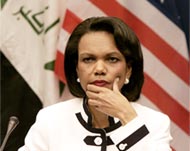US calls for Iraq reconstruction help
The United States and the European Union have rallied global support for Iraq’s quest for post-war recovery.

At an international conference in Brussels on Wednesday, Iraqi Prime Minister Ibrahim al-Jaafari appealed for help to fight a Sunni-led rebellion and to rebuild his country.
US Secretary of State Condoleezza Rice attacked Syria for failing to stop fighters crossing its border into Iraq and, despite violence that has killed more than 1000 Iraqis and 120 US troops since April, insisted Iraq was “well on the way to democracy”.
“This is certain to be an Iraq which, unlike the Iraq of Saddam, is likely to be a stabilising force in the region,” she told a news conference after the meeting attended by some 80 nations and organisations.
A final communique urged Baghdad to “intensify efforts to engage all parties renouncing violence in the political process”, and Iraqi officials renewed pledges that a constitution due by 15 August would try to embrace all Iraqis.
“This country belongs to all. No one wants to marginalise any one section in Iraq,” said Foreign Minister Hoshyar Zibari.
Al-Zarqawi statement
 |
|
Rice accused Syria of failing to |
Non-Kurdish Sunni Muslim Arabs mostly boycotted the 30 January elections. The Shia and Kurdish communities dominate the transitional government in Baghdad.
The panel charged with drafting a constitution for Iraq agreed last week to raise Sunni numbers in the body, a move welcomed as a first step by conference participants.
The joint EU-US event is a product of US President George Bush’s trip to Europe in February to mend ties after the transatlantic rift sparked by the US-led invasion of Iraq.
Iraq’s al-Qaida group, led by Abu Musab al-Zarqawi, denounced the meeting, saying: “The enemies of God gather at the conference in Brussels to destroy Iraq, not to build it.”
US and European leaders kept a lid on tensions over the Iraq conflict. “Iraqis need our solidarity,” French Foreign Minister Philippe Douste-Blazy said, announcing a French offer to train several dozen Iraqi police officers in Paris.
The meeting explored practical ways the world could help Iraq but left detailed decisions on aid to a donors’ meeting scheduled for next month in the Jordanian capital, Amman.
UN role
 |
|
The US is battling ongoing violence |
The communique urged all nations to boost diplomatic ties with Iraq. Jordan and Egypt promised to send ambassadors soon.
British Foreign Secretary Jack Straw promised British troops would stay in Iraq as long as they were needed, and Nato chief Jaap de Hoop Scheffer said the alliance’s officer training mission would “go on well into the foreseeable future”.
UN Secretary-General Kofi Annan reaffirmed the role of the United Nations in Iraq but, in an apparent reference to the violence, said its presence was linked to events on the ground.
“Our focus is not on size or visibility, but on making a real difference,” he told the conference.
Hailing November’s debt relief deal with Paris Club creditor nations, Iraqi Finance Minister Ali Allawi said Iraq was “well-advanced” in readying proposals with others, including commercial creditors.
But although the meeting’s communique called for generous debt relief for Iraq, Zibari was circumspect about whether major creditors Kuwait and Saudi Arabia were willing to slash debt.
Syria criticism
|
“This is certain to be an Iraq which, unlike the Iraq of Saddam, is likely to be a stabilising force in the region“ |
“We are getting some positive responses,” he said, adding that Baghdad expected to resume relations with the two Gulf states. “I think they will be supportive.”
Iraqi’s government says it inherited debts of $125 billion from the Saddam Hussein era, mostly to fund its 1980-1988 war with Iran. Saudi Arabia and Kuwait provided much of the war-chest.
The Brussels communique also urged Iraq and its neighbours to cooperate on frontier security. Rice, in some of her sharpest criticism of Damascus, said Syria, in particular, must do more.
“Syria has a responsibility … not to allow its territory to be used for the gathering of people who are wreaking havoc and causing harm against innocent Iraqis,” she said.
But Syrian Foreign Minister Faruq al-Shara accused the US, without naming it, of denying Damascus sophisticated monitoring equipment that would help it guard the frontier.